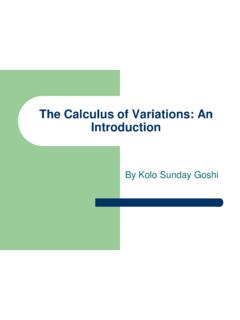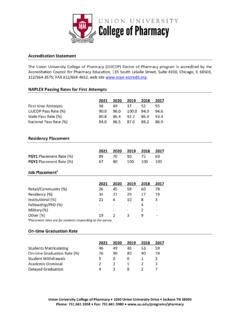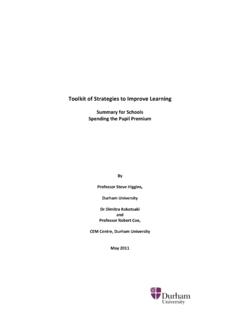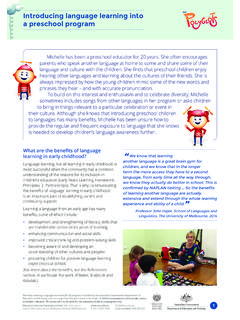Transcription of Effective Strategies for Improving College …
1 Effective Group Work Strategies for the College Classroom. content fromAMAGNAPUBLICATIONE ffective Strategies forImproving College Teachingand Learning2 Effective Strategies for Improving College teaching and learning Strategies FOR Improving COLLEGETEACHING AND LEARNINGWhen teachers think the best, most important way to improve their teaching is by devel-oping their content knowledge, they end up with sophisticated levels of knowledge, butthey have only simplistic instructional methods to convey that material. To imagine thatcontent matters more than process is to imagine that the car is more important than theroad. Both are teach andhowwe teach it are inextricably linked andvery much dependent on one special report features 11 articles pulled from the pages ofThe teaching Professortohelp you discover new ways to build connections between what you teach and how youteach it.
2 The report offers tips on how to engage students, give feedback, create a climatefor learning , and more. It also provides fresh perspectives on how faculty should approachtheir development as s been said that few things can enhance student learning more than an instructor s com-mitment to ongoing professional development. Here s a sample of the articles you will findinEffective Strategies for Improving College teaching and learning : Faculty Self-Disclosures in the College Classroom A Tree Falling in the Forest: Helping Students Hear and Use Your Comments Understanding What You See Happening in Class Can Training Make You a Better Teacher? Striving for Academic ExcellenceAlthough there is no single best teaching method, approach, or style, this special reportwill give you a variety of Strategies to try.
3 Those that work effectively with your studentsyou should make your WeimerEditorTheTeachingProfessor3 Effective Strategies for Improving College teaching and learning of ContentsFaculty Self-Disclosures in the College Classroom ..4 Content Knowledge: A Barrier to Teacher Development ..5A Tree Falling in the Forest: Helping Students Hear and Use Your Comments ..5 What Are They Doing Over There in the English Department? ..7 Understanding What You See Happening in Class ..8 Warming the Climate for Perspectives on a Shared Classroom the Best for Academic Excellence ..12 Can Training Make You a Better Teacher? ..13 The Benefits of Music and Stretching in Maintaining Student Attention ..144 Effective Strategies for Improving College teaching and learning Self-Disclosuresin the CollegeClassroomBy Sarah M.
4 Ginsberg, interviewing university faculty for a studyabout classroom communication, Jim,* aprofessor of history, made this comment about acolleague he had observed teaching : I was really amazed,when I saw him teach, how little of his personality yousee. This starkly contrasted with his perception of his ownteaching style, about which he said, I try to use humor alot. My dad says I just think funny, you know, and I do; it shard for me not to joke around. This comment started mewondering about how much of ourselves we let ourstudents in my own teaching career, I was acutely consciousof trying to find that perfect balance between the desire tolet my students know that I was a whole person, with lifeexperiences that influence my understandings of our worldand the course content, and the desire to limit how muchof my personal life I exposed in my classroom.
5 Althoughwatching my own children develop language is potentiallypertinent to the views of language development discussedin class, I don t want students to know intimate details ofmy family life, nor do I want to bore them with endlesscute-child research has suggested to me that there is great valuein College faculty exposing a few aspects of their personallives to their students. In my study, conducted at a public,comprehensive university, I found that when teachers werewilling to share small characteristics of themselves, theirstudents found them to be approachable and the 64 percent of the faculty study participantswho were perceived by their students to be Effective com-municators, 100 percent of them were observed disclosingsmall facets of their personal lives in the details these faculty shared related to course example, Joan, an English professor teaching aboutwriting brochures for educational purposes, said to herstudents, I picked up a brochure for our project when Itook my son to his swimming lesson.
6 In this statement,she shared a bit about her life beyond the classroom anddemonstrated how course content connected with her reallife. When another faculty member, Maura, shared that shehas a daughter beginning College at another university, sheshowed that she understands from multiple perspectiveswhat it is like to be a College and Maura reflected on and discussed further theirstruggle between the personal and the professional naturesof the relationships. They wanted their students to feel thatthey are accessible and friendly, but not inappropriately signs his first name to his emails to be informal butactually wants to be called Professor. He was aware ofthe potential for the informal, personal conversations withhis students to be misconstrued and was cautious becauseI don t want students to feel too close.
7 Maura realized thather early career na vet put her professional credibility injeopardy. Since then, she has worked hard to find theright place between the formal and the informal, and has found that niche. In sharing my research with faculty, I have beenintrigued by their responses to the idea of self-disclosing inthe classroom. One memorable professor stood up andexclaimed, That is fine for faculty who lead traditional,mainstream lives! Faculty who are gay or lesbian cannotshare that kind of information without fear of reprisal. Iagree that there are many aspects of our lives that wecannot or should not share with our students. On the otherhand, I do think that each of us probably has some smallcharacteristic, be it our love of chocolate or our preferencefor cats over dogs, that humanizes us to our students.
8 Thestudents in this study repeatedly described the faculty whodisclosed small personal details as approachable and comfortable to talk with. Although faculty members ap-proachability cannot be completely accounted for by theseself-disclosures, they were noted specifically by thestudents as contributing to it. If our goal as faculty is tohave students seek us out when they are in need of assis-tance, it is worth considering the value of these smallpersonal disclosures toward increasing our accessibility.*All names are pseudonyms to protect participant Sarah M. Ginsberg is an associate professor at EasternMichigan our goal as faculty is to have studentsseek us out when they are in need ofassistance, it is worth considering the valueof these small personal disclosures towardincreasing our Knowledge:A Barrier to TeacherDevelopmentBy Maryellen Weimer, , there s a story headline you might read in theeducational equivalent of theNational that your material prevents instructionalgrowth?
9 How can that be?A love of the material and a willingness to convey that tostudents only enhances learning . The problem is when thecontent becomes the be-all and end-all of the teachingprocess, when the content matters more than anything content is that important, faculty are prevented fromusing methods that enhance how much students learn. Inthis case the content orientation of faculty hurts students,but the argument here is that it also hurts teachers think the only, the best, the mostimportant way to improve their teaching is by developingtheir content knowledge, they end up with sophisticatedlevels of knowledge, but they have only simplistic instruc-tional methods to convey that material. To imagine thatcontent matters more than process is to imagine that thecar is more important than the road.
10 Both are teach andhowwe teach it are inextricably linkedand very much dependent on one though both are tightly linked, they are stillseparate. Development of one doesn t automaticallyimprove how the other functions. So you can work to growcontent knowledge, but if the methods used to convey thatknowledge are not sophisticated and up to the task, teaching may still be quite ineffective. It may not inspireand motivate students. It may not result in more and betterstudent learning . Because teachers so love the content,they almost never blame it. No, it s the students aren t bright enough. They don t study enough. Theydon t deserve to be professionals in this teachers who teach courses in which large numbersof students struggle and routinely fail are not generallypositive about teaching .













